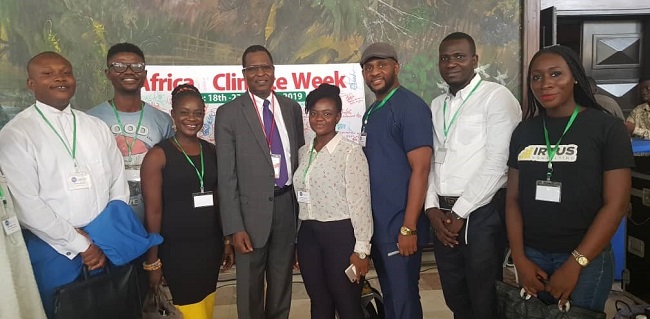Wednesday, August 12 marks the 2020 International Youth Day, a day to celebrate the voices, actions and contributions of young people in building a better world.

This year’s theme is “Youth Engagement for Global Action” – an opportunity to highlight the engagement of young people in climate action at the local, national and global levels as well as in the UN Climate Change process.
According to UN estimates, there are 1.21 billion young people between the ages of 15 and 24 in the world today, accounting for 15.5 per cent of the global population.
The need to include youth voices has become more pressing than ever as young people, whose futures are threatened by accelerating global heating, are increasingly demanding action towards a more just, equitable, and climate-resilient society.
The voices and contributions of the youth are notably essential for the effective implementation of the Sustainable Development Goals and of the Paris Agreement, as recognised in the preamble of the Paris Agreement which reaffirms intergenerational equity as a guiding principle shaping climate action.
“Most of the global challenges we face today, especially climate change, require a concerted and inclusive global effort where everyone can meaningfully contribute. Youth can be an important positive force for change and climate action when engaged and empowered effectively. So, on this youth day let us recognize and celebrate the key role of youth in our societies and welcome their ideas and participation,” said Adriana Valenzuela, UN Climate Change Education and Youth focal point.
YOUNGO Officially Represents Youth in the UNFCCC Context
YOUNGO is the official Youth Constituency of the UNFCCC and is invited to represent youth at negotiations and other UN events related to climate change.
YOUNGO organises the annual Conference of Youth which brings together young people from around the world to exchange ideas, good practices and experiences to strengthen climate action.
Since 2012, two YOUNGO focal points are nominated each year – one from the Global North and one from the Global South to ensure fair youth representation at the intergovernmental processes.
These focal points work closely with the Action for Climate Empowerment Agenda to design and implement activities and regularly provide input to shape global climate policies.
Marie-Claire Graf, YOUNGO Focal Point for Global North, said: “Youth must sit at the table when decisions are taken and be included in climate-related policy formulation as well as its implementation.”
And Heeta Lakhani, YOUNGO Focal Point for Global South, added: “Youth have the solutions to ensure that the inheritance we leave for our future generations is one of justice, equality and a healthy planet. We need everyone to work together to achieve this.”
The Action for Climate Empowerment Agenda
The UN Framework Convention on Climate Change (UNFCCC) says it actively acknowledges the role of youth as essential partners in the fight against climate change and facilitates youth engagement under its Action for Climate Empowerment (ACE) agenda.
And the Katowice package recognises the key role of youth in the implementation of ACE. The ACE programme under the Doha Work Programme (2012-2020) works to educate, empower and engage youth in climate action and encourages their participation in developing and implementing climate policies.
It does so by undertaking various activities such as organising the annual Global Youth Video Competition and hosting the Young and Future Generations Day which features the intergenerational inquiry on climate change event and includes high-level youth briefings and a UN Youth Booth at the annual Conferences of Parties (COPs).
Engagement of youth in the intergovernmental and formal policy-making processes enables better, more inclusive, and sustainable policies.
The ACE Dialogues provide such a platform to youth to present their ideas to governments.
Youth can also currently engage in the global consultation process to design stronger national action plans through the NDC partnership and UNDP’s NDC Support Programme to develop and review their country’s nationally determined contribution (NDC).
In addition, Italy, in partnership with the UK, is organising youth dialogues and events in the lead up to COP26.
The Italian Ministry of Environment, in collaboration with Connect4Climate – World Bank Group and the Office of Secretary-General’s Envoy on Youth, has recently launched a series of virtual, interactive sessions for youth entitled “Youth4Climate Live Series: Driving Momentum Towards Pre-COP26” where the youth can join the conversation on climate action.
And finally, youth and children can participate in ongoing competitions such as Youth Policy Case Competition and the Children’s Visual Art Competition organised by The Adaptation Exchange.
